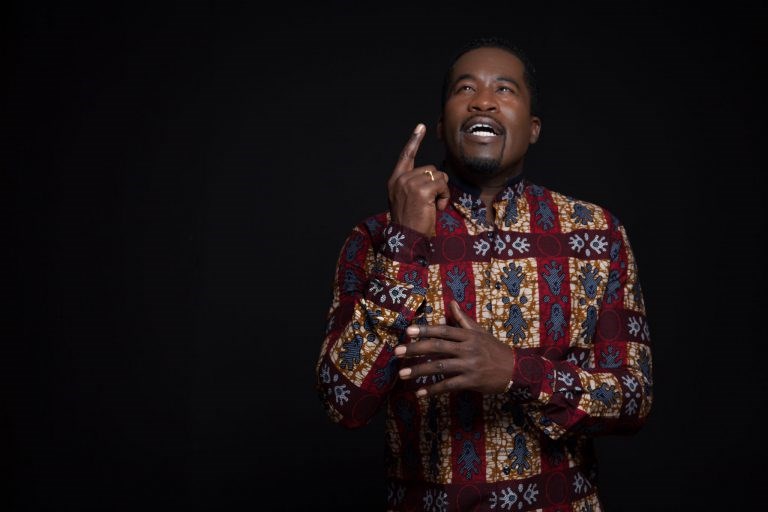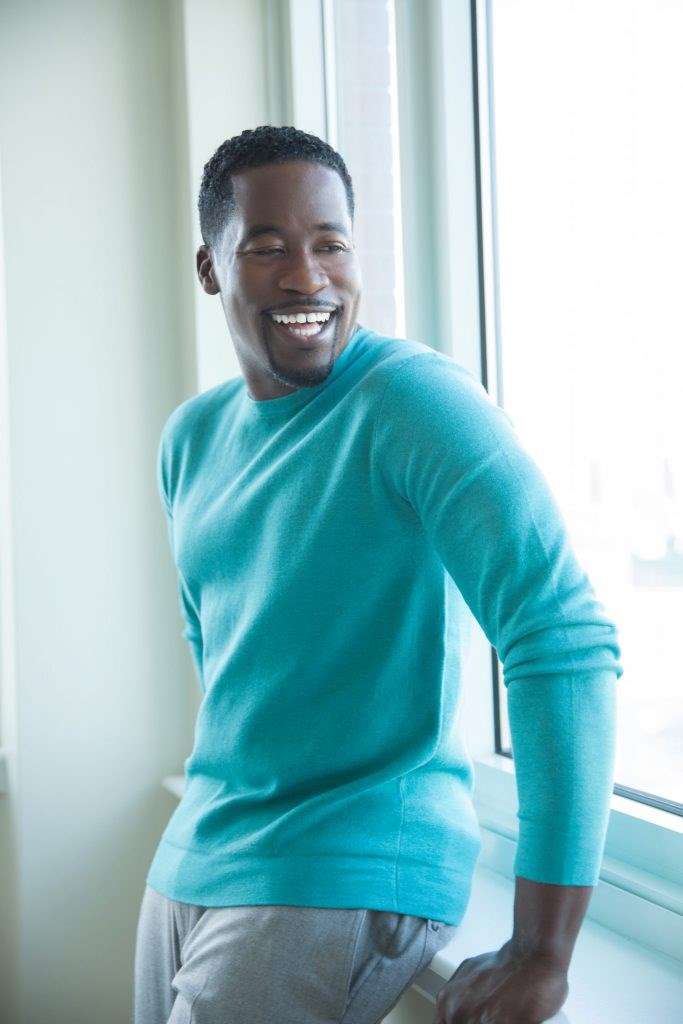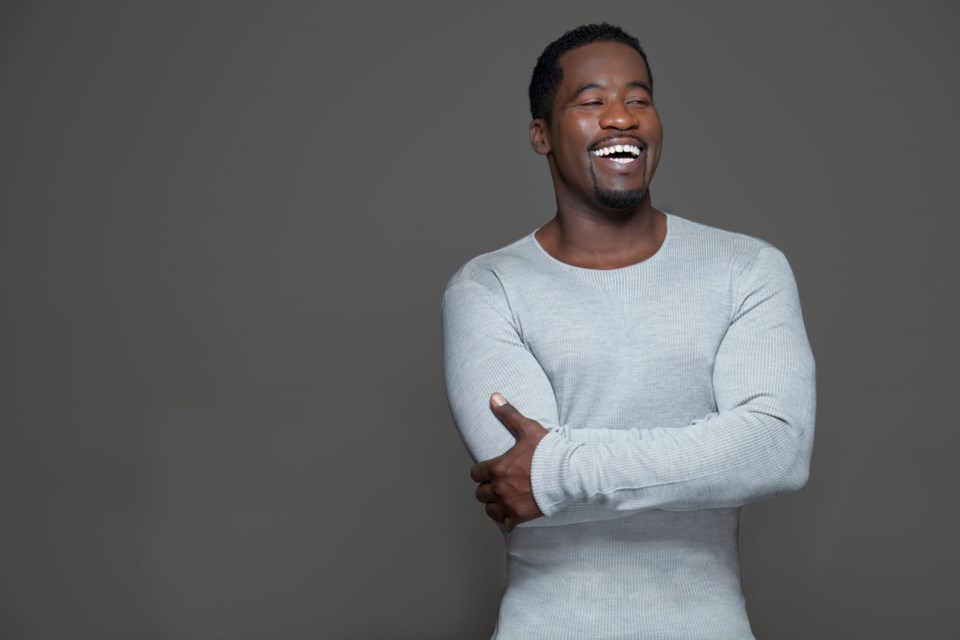Imagine this: A slave ship rises in front of the Statue of Liberty in present-day New York City, sending the city into a frenzy as the people try to understand this bizarre and unexplainable phenomenon. This is what happens in Emergency, the Obie Award-winning play written and performed by Daniel Beaty.
Daniel Beaty is an all-round artist: actor, singer, writer and community activist. His critically acclaimed plays Through the Night, Emergency, Mr. Joy, Breath & Imagination, and The Tallest Tree in the Forest — Paul Robeson have been produced at leading theaters across the nation and venues ranging from Lincoln Center to the White House, garnering numerous awards including an Obie award for writing and performance and three NAACP Theatre Awards. A highly requested keynote speaker, Beaty has spoken throughout the U.S., Europe and Africa.
In Emergency, Beaty portrays 43 (!) characters, exploring the shared experience of our humanity and what it means to be free. The piece is an intricately woven, urgent, witty and moving commentary of modern African American life. More than a decade after its debut in 2006, Beaty brings Emergency to the Kumble Theater on Saturday, February 17 and Sunday, February 18.
Daniel Beaty, a man who wears many hats, shared with BK Reader in a personal interview what drives him to perform the various roles both on stage and in life, the experiences that infuse his art that has become his lifeline and why Emergency is still significant today.
[perfectpullquote align="left" cite="" link="" color="" class="" size=""]My purpose is always the same: It is to give voice to the voiceless and to tell stories that inspire us to transform pain into power.[/perfectpullquote]
BKR: You are an artist who wears many different hats: You're a writer, an actor, a poet - you even sang opera in Europe - and you're an activist, too. How do you manage all these different roles?
DB: For me, it's all about storytelling. My purpose is always the same: It is to give voice to the voiceless and to tell stories that inspire us to transform pain into power. That pain can be the legacy of brokenness in this country like the legacy of slavery, continual racism and the lack of equity that plagues our country. That pain can also be the personal trauma that people experience from family issues or broken dreams. I believe that the arts and entertainment, whether it is a play, a book or movie, a curriculum I am creating or social justice activism that I am doing, it is all going after the same gain: How do we tell a story that's going to cause people to feel a little bit freer and to cause those of us who do not have sufficient voice to have more voice.
BKR: Actors are known to often fully immerse themselves in their roles, to explore the characters they bring to life. In Emergency, you play 43 characters. How do you create all these different characters, and how do you switch from one to the other?
DB: The artist's greatest tool is observation. And that means not just observing with your eyes, but observing with your heart, your mind, your soul. I am constantly letting life impact me. Whether that's something I see on the news or I witness on the street. All of that is available to me when I create characters or stories. I create from the inside out. I let the rich inner landscape allow characters to emerge. And once I have a burning need for something that a character needs to say, then I let that voice reveal itself. During the performance, it is actually quite easy for me to go in and out of character because I created a character with an emotional need, a very specific voice and body. I know them from the inside out - and that's how I do it.
BKR: And at the end of the day, how do you get back to yourself?
DB: I was determined very early on not to be a tortured artist. My wellness is as important to me as my career. I look at my performance like a service, a gift that I am giving back. But it's separate from who I am personally. Who I am is a being and an entity that is pretty well-managed with regards to my thought process and my emotional, mental and spiritual well-being. That commitment to my own wellness allows me to be whatever the character needs me to be.

BKR: What inspired you to write Emergency as a one-person play with these many different characters?
DB: When one person can inhabit so many different characters with real dimension and humanity, it underscores the idea that we're truly all connected to each other. We're all responsible for each other. That is the main reason why I created it that way. And it can be very entertaining. It can also allow some very deep - and sometimes difficult and complex - ideas around race and class in this country to become bearable because it is centered in this very entertaining way.
[perfectpullquote align="right" cite="" link="" color="" class="" size=""]A slave ship in front of the Statue of Liberty asks the question: What stands in front of our freedom?[/perfectpullquote]
BKR: There may be an obvious reason why you chose the setting of the play, the Statue of Liberty and NYC. Can you elaborate a little further?
DB: Well, I thought it was obvious - but people perceive in different ways. For me, slavery is the time of greatest bondage in our nation's history. And the Statue of Liberty is the greatest symbol of freedom in our country. So, a slave ship in front of the Statue of Liberty asks the question: What stands in front of our freedom? And that's what all the characters in the play are wrestling with. What stands in front of their freedom: Their freedom to love, to be fully themselves, to believe in their dreams - their freedom to be greater than the pain of their past. They all fight to be free from something.
BKR: You debuted Emergency in 2006; since then it has won awards and received many accolades. More than a decade later: Why do you still keep performing it?
DB: I believe that many of the themes that I explore in Emergency, themes that I was looking at over ten years ago, are resurfacing today because of our administration and because of things like the media shifting or police brutality coming to the forefront. There is a lot of division in our nation. And this work is going right into the core of that division and how it impacts people on an individual level, and also how it impacts us on a societal level.
[perfectpullquote align="left" cite="" link="" color="" class="" size=""]I basically began to understand that to be human can be extremely challenging at times and that we all have our parcel of pain.[/perfectpullquote]
BKR: What personal experiences infuse your performances - which, assumingly, are also motivation for all the different hats you wear in your professional life?
DB: There is a poem of mine, Knock Knock, it's my personal story about my relationship with my father. My father is a heroin addict and he's been in and out of prison over 60 times over the course of my life. My older brother is addicted to crack cocaine and has also been in and out of prison. This journey about being free started with me: It was me trying to be free from that hurt and the fear that I am destined to have those same challenges. Then I looked around, and I realized, I was not the only one feeling bound and afraid. Other people in my family did, too. I took a wider look, and as I traveled the world, I saw what was going on within the nation and many places all over the world. I basically began to understand that to be human can be extremely challenging at times and that we all have our parcel of pain. The arts are a beautiful way to help people find their way through that difficulty and that pain, and are a powerful way to inspire us to ask the deeper question of the "why." I wanted to know why my daddy, my mama and my brother were hurting. For me, one of those reasons is that we have a lot of unsolved division in this country which is impacting us on a societal level and individually.

BKR: You said you feared to be destined to have the same challenges as your father or your brother - what helped you to find your own path away from that?
DB: Honestly, I was under a tremendous amount of pain. I had times, in college, when I was suicidal. But I was desperate to be alive. First, there was singing. The time in the studio and at rehearsals was giving me a little bit of peace. Then I also began creating characters and I realized that this pain, that I was feeling inside, could actually help me make a character that was powerful and moved people. That's how I found a lifeline. I also realized it wasn't just about me. God had allowed these things to happen in my life, so that I can be of service and that I can try to help others through telling a good story. While I am doing my service, God would be working on my issues, and I was healing. Art became my lifeline. And this play, Emergency, was the first expression of that lifeline.
Brooklyn Center for the Performing Arts presents Daniel Beaty's Emergency
When: Saturday, February 17 at 8:00 pm and Sunday, February 18 at 3:00 pm/ Tickets are $30 and available here.
Where: Kumble Theater at LIU Brooklyn, 1 University Plaza, Brooklyn




